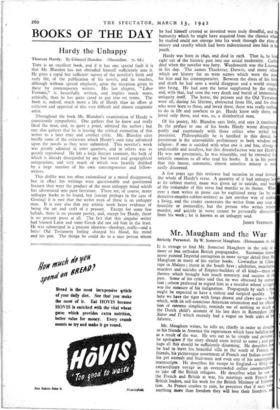BOOKS OF THE DAY
Hardy the Unhappy
Thomas Hardy. By Edmund Blunden. (Macmillan. 7s. 6d.) THIS is an excellent book, and if it has one special fault it is that Mr. Blunden has not obtruded himself sufficiently into it. He gives a rapid but sufficient survey of the novelist's birth and early life, of the publication of his novels, and he touches, although without special emphasis, upon the reception given to these by contemporary writers. His last chapter, " Liber Veritatis," is beautifully written, and implies much more, critically, than he has quite cared to put into set terms. The book is, indeed, much more a life of Hardy than an effort at criticism and appraisal of this very difficult and almost enigmatic artist.
Throughout the book Mr. Blunden's examination of Hardy is consistently sympathetic. One gathers that he knew and really liked the man, and, to quite a point, admired the author ; but one also gathers that he is leaving the critical estimation of this writer to a later time and Bother critic. Mr. Blunden cites briefly some of the criticisms which Hardy's own time advanced upon the novels as they were submitted. This novelist's work was greatly admired in some quarters, and in others was as greatly reprobated. He left a large literary remnant, the bulk of which is already disregarded by any but moral and geographical antiquarians, and very much of which was heartily disliked by a large number of his own contemporaries and fellow- writers. This dislike was too often rationalised as a moral disapproval, but in effect his writings were questionable and questioned because they were the product of the most unhappy mind which has adventured into pure literature. There are, of course, many unhappy books to be found, but (except perhaps in the case of Gissing) it is rare that the writer even of these is an unhappy man. It is rare also that any artistic work bears evidence of being the art and craft of a peasant. Except for some few ballads, there is no peasant poetry, and, except for Hardy, there is no peasant prose at all. The fact that this singular writer had learned Latin and some Greek did not aid him in the least. He was submerged in a peasant ideation—theology, really—and a bitter Old Testament feeling charged his blood, his mind and his pen. The things he could do to a nice person whom
he had himself created or invented were truly dreadful, and humanity which he might have acquired from the classics w he studied could not emerge into his work through the plate misery and cruelty which had been indoctrinated into him in youth.
Hardy was born in 1840, and died in 1928. That is, he liv right out of the historic past into our actual modernity. Carl died when the novelist was forty. Wordsworth was the Laureat in his day. The names Thackeray, Darwin, and many oth which are history for us were names which were the n for him and his contemporaries. Between the dates of his and death he had seen a world disappear and a world struggl into being. He had seen the horse supplanted by the engin and, with that, had seen the very death and burial of immemori antiquity itself. The horse, the peasant and the Old Testamen were all, during his lifetime, abstracted from life, and for th, who were born to these, and loved these, there was really nothin to do in life and nowhere to go. Hardy knew only these, a loved only these, and was, so, a disinherited man.
Of his poetry, Mr. Blunden says little, and says it cautiously In the preface to one of his books Hardy wrote disagree' gently and courteously with those critics who styled h' pessimist. Philosophically he is justified in this denial, f pessimism is the unavoidable preliminary to both wisdom a religion: if one is satisfied with what one is and has, change undesirable and needless, but this dissatisfaction was not Hardy' He was not pessimistic, he was miserable, and he extended infertile emotion to all who read his books. It is in his poet that this innate, automatic, almost senseless misery is m' easily discerned.
A few years ago this reviewer had occasion to read throug the whole of Hardy's verse. A quantity of it had unhappy be as its subject matter, more was given up to suicide, and mu of the remainder of this verse had murder as its theme. What ever a man writes in prose can be explained away (as by o detective-murder-robber-writers) as just another way of malt. a living, and the reader exonerates the writer from any taint brutality or immorality, but the person who writes mise murder, and suicide in verse cannot be personally dissociat from his work ; he is known as an unhappy soul.
1 . I
JAMES STEPHENS.


























 Previous page
Previous page